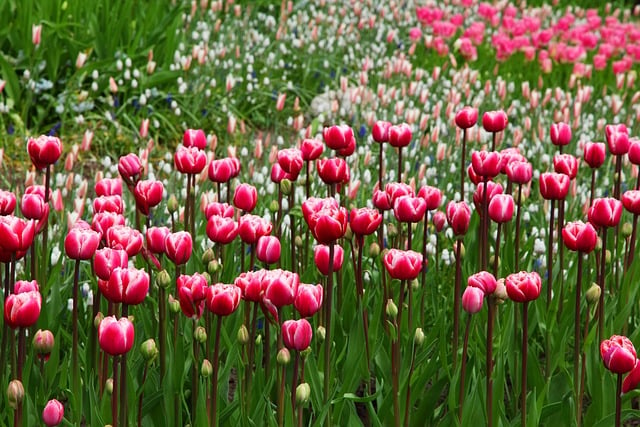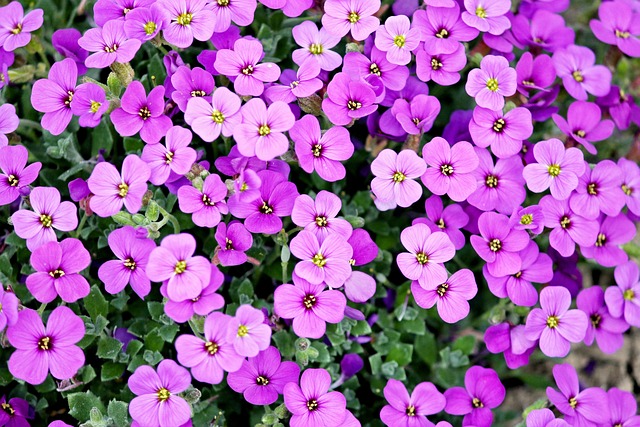This guide outlines essential seasonal care for a thriving garden. It emphasizes spring preparation with deep watering, summer watering tips, and strategic pest control. Fall cleanup strategies include pruning, deadheading, and targeted pest management. Winter protection involves covering delicate plants, proper aeration, drainage, and mulching to insulate soil and enrich it for seasonal changes. These practices ensure optimal garden health year-round.
As seasons change, so does your garden’s needs. This comprehensive guide navigates the crucial aspects of seasonal garden maintenance, ensuring your outdoor space thrives through every transition. From spring garden preparation and strategic summer watering to effective fall cleanup strategies and robust winter protection, learn how to prune, fertilize, and protect your plants according to nature’s rhythm. Discover the secrets to managing pests seasonally and explore the benefits of mulching for optimal results in every season.
- Spring Garden Preparation: Laying the Foundation for a Healthy Season
- Summer Watering Tips: Ensuring Your Plants Thrive Amidst Warmth and Growth
- Fall Cleanup Strategies: Preparing Your Garden for Winter's Rest
- Winter Garden Protection: Safeguarding Plants Until Spring's Return
Spring Garden Preparation: Laying the Foundation for a Healthy Season

Spring marks a pivotal time for gardeners, serving as the foundation for a thriving garden throughout the year. Seasonal garden maintenance begins with careful planning and preparation. Prioritize deep watering during dry spells, following summer watering tips to ensure plants establish robust roots before the heat subsides. This sets the stage for stronger, healthier growth come autumn and winter.
As seasons change, implement fall cleanup strategies to remove dying vegetation and prevent the spread of diseases. Prune seasonal plants, fertilize according to schedules tailored for each season, and employ targeted pest control measures to ward off common garden invaders. Protect delicate plants from harsh winters with appropriate covering, while ensuring proper aeration and drainage to avoid moisture-related issues. Finish by applying a layer of mulch, offering insulation and nutrient-rich soil amendments that support plant health throughout the year.
Summer Watering Tips: Ensuring Your Plants Thrive Amidst Warmth and Growth

As the seasons change from spring to summer, your garden requires specific care to thrive amidst the warmth and rapid growth. Summer watering tips are essential for maintaining a healthy garden during this period. Deep watering early in the morning or late in the evening is more effective than watering during the hottest parts of the day to minimize evaporation. Focus on providing adequate water to the root zones, ensuring your plants receive enough moisture without overwatering. This promotes robust growth and prepares them for the fall transition.
In preparation for the upcoming fall cleanup strategies, regular weeding and deadheading spent flowers are recommended. Pruning seasonal plants helps shape their growth and encourages new development. Adjusting fertilizing schedules by season is crucial; apply fertilizers specific to summer growth in spring and early summer to promote lush foliage and vibrant blooms. Seasonal pest control measures should also be implemented to prevent infestations, using eco-friendly methods whenever possible. Additionally, mulching around plants can protect them from extreme temperatures, conserve moisture, and suppress weeds—a simple yet effective practice for adapting to seasonal changes.
Fall Cleanup Strategies: Preparing Your Garden for Winter's Rest

As the seasons change, fall offers a crucial period for preparing your garden for the winter ahead. Implementing effective cleanup strategies is essential to ensure your plants’ health and vitality come spring. Start by removing any dead foliage, weeds, and spent flowers to reduce pest habitats and prevent diseases from taking hold. Prune seasonal plants, trimming back growth to promote new development in the upcoming year. Remember that fall is also an ideal time for fertilizing; choose a slow-release fertilizer suitable for your region’s climate to provide sustained nutrients throughout winter.
Additionally, consider mulching as a key step in winter garden protection. A layer of organic mulch insulates soil, preserves moisture, and suppresses weeds, creating a favorable environment for root growth. Adjust your watering habits according to the season; while summer required consistent hydration, fall may call for less frequent but deeper waterings to strengthen roots before dormancy. Implement seasonal pest control measures, focusing on natural solutions, to discourage pests from feasting on your garden’s resources during this transition period.
Winter Garden Protection: Safeguarding Plants Until Spring's Return

As autumn’s chill sets in, preparing your garden for winter is crucial to ensure plants survive until spring’s return. The first step involves pruning seasonal plants, removing dead or damaged growth and thinning crowded areas to promote better air circulation and reduce pest habitat. Remember that different plants have distinct needs, so research specific pruning techniques for each variety.
Fertilizing schedules also shift with the seasons. In fall, focus on applying a balanced fertilizer to provide essential nutrients for root development before winter dormancy. Mulching is another vital practice; adding a layer of organic mulch helps insulate soil, retain moisture, and suppress weeds during colder months. This simple step can significantly enhance your garden’s resilience and health when spring arrives. Additionally, consider seasonal pest control measures to protect plants from insect and disease pressures that may emerge in the changing weather.
As the seasons change, a well-maintained garden thrives through strategic seasonal garden maintenance. From spring’s foundational preparation to summer’s meticulous watering, fall cleanup ensures a peaceful winter’s rest, and effective winter protection safeguards your plants until spring’s rebirth. By employing techniques like pruning, fertilizing according to schedules by season, adopting seasonal pest control measures, and utilizing mulching for transitional changes, you nurture your garden through every phase. These practices not only ensure vibrant blooms and lush foliage but also contribute to a beautiful, thriving outdoor space year-round.
